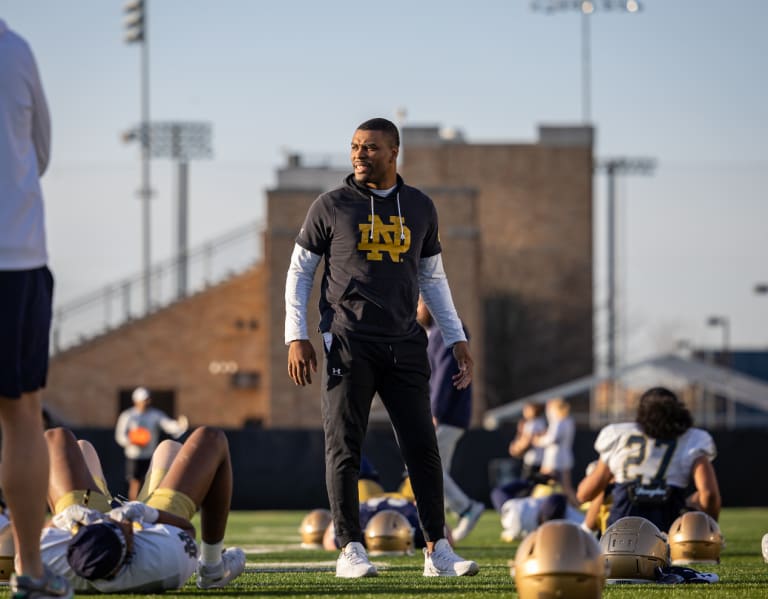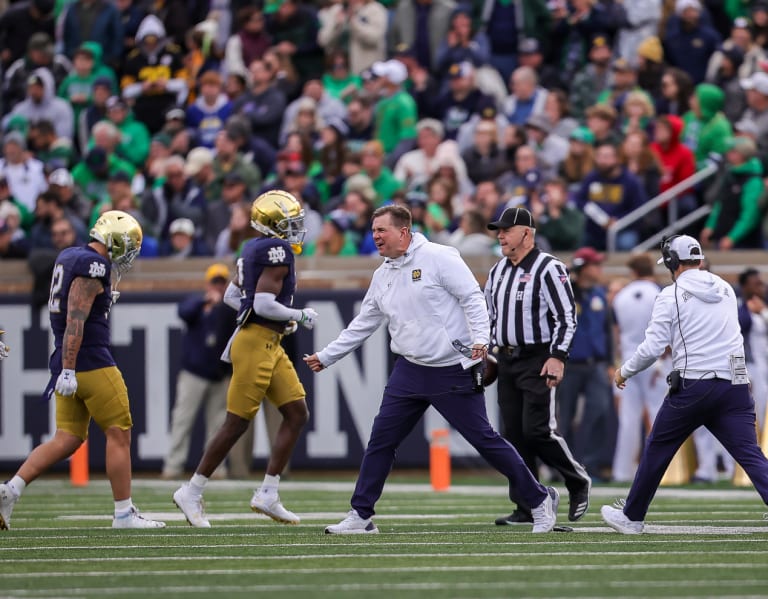The Fascinating History Of Notre Dame Football Coaches: A Legacy Of Excellence
Notre Dame football has always been synonymous with excellence, tradition, and a rich history. At the heart of this legacy are the extraordinary coaches who have shaped the program into one of the most iconic in college football history. From the early days to modern times, Notre Dame's coaching staff has consistently set the bar high for collegiate athletics. This article dives deep into the storied history of Notre Dame football coaches, exploring their impact, achievements, and the values they instilled in the program.
Notre Dame football is more than just a sport; it is a cultural phenomenon that has captured the hearts of fans worldwide. The university's commitment to excellence extends beyond academics, permeating every aspect of its athletic programs. At the forefront of this success are the coaches who have led the Fighting Irish to glory on numerous occasions. Their leadership, strategies, and dedication have been instrumental in building Notre Dame's reputation as a powerhouse in college football.
In this comprehensive article, we will explore the history of Notre Dame football coaches, highlighting their contributions, challenges, and triumphs. Whether you're a die-hard fan or a newcomer to the world of college football, this article aims to provide valuable insights into the men who have defined the Fighting Irish's legacy on the gridiron.
Read also:Whos In Baytown Jail Tx A Comprehensive Guide To Understanding Jail Roster And Inmate Information
Table of Contents
- The Early Years: Foundations of Notre Dame Football
- Knute Rockne: The Golden Era Begins
- The Post-Rockne Era: Transition and Transformation
- Modern Coaches: Building on a Legacy
- Key Achievements and Milestones
- Coaching Philosophy: Values and Principles
- Impact on Players: Developing Champions
- Challenges Faced by Notre Dame Coaches
- Notable Notre Dame Football Coaches
- The Future Direction of Notre Dame Coaching
The Early Years: Foundations of Notre Dame Football
The history of Notre Dame football dates back to the late 19th century, with the first official game played in 1887. During these formative years, the program was led by a series of coaches who laid the foundation for future success. These early coaches, though not as well-known as their successors, played a crucial role in establishing Notre Dame's presence in collegiate athletics.
One of the key figures during this period was Jesse Harper, who served as the head coach from 1913 to 1917. Harper's innovative approach to coaching and his emphasis on teamwork helped transform Notre Dame into a competitive force in college football. Under his leadership, the Fighting Irish achieved significant victories, including a memorable win against Army in 1913.
During this era, Notre Dame football began to develop its unique identity, characterized by a commitment to excellence both on and off the field. The values instilled by these early coaches continue to influence the program today, setting the stage for the legendary coaches who would follow.
Key Contributions of Early Coaches
- Established the groundwork for Notre Dame's competitive spirit.
- Introduced innovative strategies that revolutionized the game.
- Emphasized the importance of teamwork and discipline.
Knute Rockne: The Golden Era Begins
Knute Rockne's tenure as head coach from 1918 to 1930 marked the golden era of Notre Dame football. Known for his visionary leadership and tactical brilliance, Rockne transformed the program into a national powerhouse. Under his guidance, the Fighting Irish won three national championships and achieved a remarkable winning percentage of 87.8%.
Rockne's impact extended beyond the field, as he became a cultural icon and a symbol of Notre Dame's rise to prominence. His famous quote, "Win one for the Gipper," inspired generations of players and fans alike. Rockne's legacy is deeply ingrained in Notre Dame's history, and his influence continues to resonate within the program.
In addition to his coaching prowess, Rockne was a pioneer in promoting college football nationally. He leveraged media and public relations to elevate the sport's profile, making Notre Dame a household name across America.
Read also:Pagliacci Joke The Art Of Clowning And Humor That Stands The Test Of Time
Rockne's Coaching Philosophy
- Emphasized mental toughness and resilience.
- Encouraged innovation and adaptability in gameplay.
- Promoted the development of well-rounded athletes.
The Post-Rockne Era: Transition and Transformation
Following Rockne's tragic death in a plane crash in 1931, Notre Dame faced the challenge of maintaining its dominance in college football. The post-Rockne era saw a series of coaches who worked tirelessly to uphold the program's standards and continue its winning tradition.
Among the notable figures during this period was Frank Leahy, who served as head coach from 1941 to 1953. Leahy's tenure was marked by four national championships and a remarkable winning percentage of 86.3%. His leadership and strategic acumen helped solidify Notre Dame's position as one of the premier programs in college football.
Despite the challenges of transitioning after Rockne's passing, Notre Dame's coaching staff remained committed to upholding the values and principles that defined the program. This period of transformation laid the groundwork for future success and ensured the continuation of Notre Dame's legacy.
Key Achievements in the Post-Rockne Era
- Four national championships under Frank Leahy.
- Development of a strong recruiting network.
- Continued emphasis on academic and athletic excellence.
Modern Coaches: Building on a Legacy
In recent decades, Notre Dame has seen a series of modern coaches who have continued to build on the program's storied legacy. These coaches have faced the unique challenges of competing in an ever-evolving landscape of college football, while maintaining the program's core values and traditions.
Notable figures such as Ara Parseghian, Lou Holtz, and Brian Kelly have made significant contributions to Notre Dame's success. Parseghian's leadership in the 1960s and early 1970s saw the Fighting Irish win two national championships, while Holtz's tenure in the 1980s and early 1990s included a national title in 1988. Brian Kelly, who took over in 2010, has revitalized the program and led the team to multiple top-10 finishes.
These modern coaches have embraced innovation while staying true to the principles that have defined Notre Dame football for over a century. Their commitment to excellence and development of players both on and off the field has ensured the program's continued relevance in today's competitive environment.
Innovations in Modern Coaching
- Adoption of advanced analytics and technology.
- Focus on player development and mental health.
- Enhanced recruiting strategies and facilities.
Key Achievements and Milestones
Throughout its history, Notre Dame football has achieved numerous milestones that have cemented its place in college football lore. From national championships to individual accolades, the program's accomplishments are a testament to the dedication and hard work of its coaches and players.
Some of the key achievements include:
- Eleven national championships (as of 2023).
- Seventy-seven consensus All-Americans.
- Multiple Heisman Trophy winners, including Johnny Lattner and Tim Brown.
These milestones not only highlight the program's success on the field but also underscore the impact of its coaching staff in developing championship-caliber teams.
Coaching Philosophy: Values and Principles
The coaching philosophy at Notre Dame is deeply rooted in the university's core values of faith, family, and football. Coaches at all levels emphasize the importance of character, discipline, and teamwork, instilling these principles in their players from day one.
Ara Parseghian once said, "Winning is important, but not as important as the values you instill in your players." This philosophy has been adopted by successive coaches, ensuring that Notre Dame football remains a program of integrity and excellence.
Coaches also prioritize the development of players as individuals, recognizing the importance of their growth both on and off the field. This holistic approach has contributed to the program's long-term success and its reputation as a model for collegiate athletics.
Impact on Players: Developing Champions
Notre Dame coaches have consistently emphasized the importance of developing players into well-rounded individuals. Through rigorous training, mentorship, and character-building activities, coaches aim to prepare their players for life beyond football.
Many former Notre Dame players have gone on to achieve success in various fields, crediting their coaches for instilling values that have guided them throughout their lives. The program's commitment to player development is a testament to its dedication to excellence in all aspects of life.
Characteristics of Notre Dame Players
- Strong work ethic and discipline.
- Commitment to academic and personal growth.
- Leadership and teamwork skills.
Challenges Faced by Notre Dame Coaches
Despite its storied history, Notre Dame football has faced numerous challenges over the years. Coaches have had to navigate the complexities of recruiting, maintaining competitiveness in a rapidly evolving sport, and upholding the program's values in the face of adversity.
One of the most significant challenges has been balancing academic and athletic demands. Notre Dame's rigorous academic standards require coaches to ensure that players excel in the classroom as well as on the field. This dual focus adds an extra layer of complexity to the coaching role, demanding exceptional leadership and management skills.
Coaches have also faced the challenge of adapting to changing rules and regulations in college football. From recruiting restrictions to eligibility requirements, the landscape of collegiate athletics is constantly evolving, requiring coaches to remain agile and innovative in their approach.
Notable Notre Dame Football Coaches
Throughout its history, Notre Dame has been home to some of the most legendary coaches in college football. These individuals have left an indelible mark on the program, shaping its identity and ensuring its continued success.
Biographies of Notable Coaches
| Name | Years Active | Key Achievements |
|---|---|---|
| Knute Rockne | 1918–1930 | 3 national championships, 87.8% winning percentage |
| Frank Leahy | 1941–1953 | 4 national championships, 86.3% winning percentage |
| Ara Parseghian | 1964–1974 | 2 national championships, 80.1% winning percentage |
| Lou Holtz | 1986–1996 | 1 national championship, 75.9% winning percentage |
| Brian Kelly | 2010–present | Multiple top-10 finishes, 67.4% winning percentage |
The Future Direction of Notre Dame Coaching
As Notre Dame football looks to the future, the program remains committed to upholding its legacy of excellence and innovation. Coaches will continue to embrace new technologies and strategies while staying true to the values that have defined the program for over a century.
The focus on player development, academic success, and character-building will remain central to the coaching philosophy at Notre Dame. By fostering an environment of growth and accountability, coaches aim to prepare players for success both on and off the field.
With a strong foundation and a commitment to excellence, the future of Notre Dame football is bright. The program's storied history serves as a reminder of the impact coaches have had on its success, ensuring that the Fighting Irish will continue to be a force in college football for


